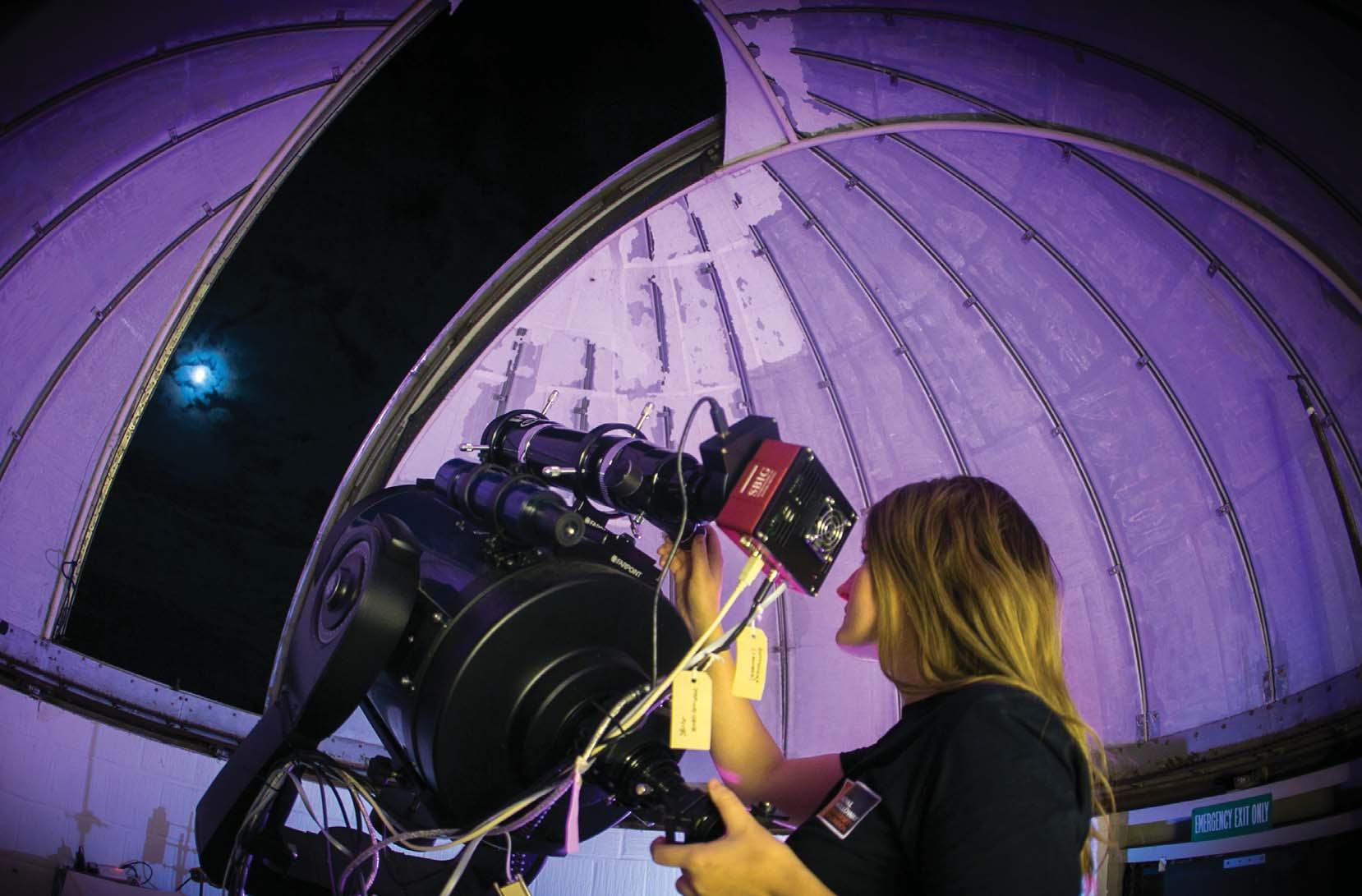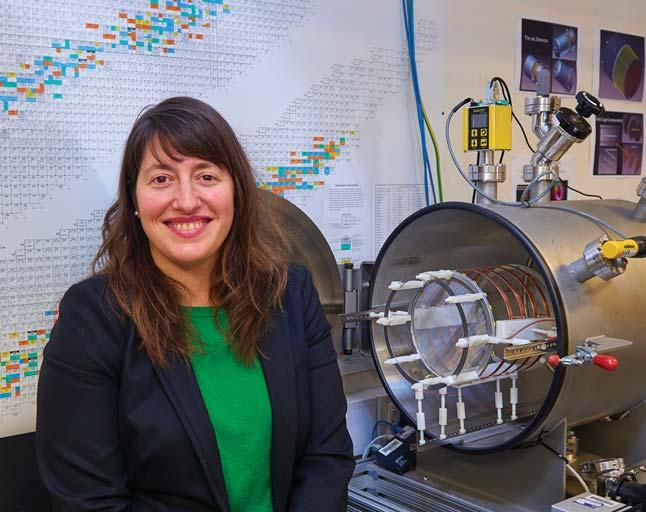
8 minute read
Physics

“ Having access to amazing facilities like the telescope has helped me to develop many skills and gives a real insight into what we learned in lectures. All the academics are inspiring and do really cool and interesting research and you get a lot of support from them.” Alanis BSc Astrophysics
Advertisement
Physics at Royal Holloway
• We are a highly-respected centre for physics teaching and research; our world-class research positively infl uences our teaching and makes our degrees intellectually stimulating. • Our students carry out an individual fi nal-year project embedded in our research groups; Quantum, Nano-,
Theoretical, Particle, Astroparticle and Accelerator
Physics. Our research is carried out in our department as well as major UK and international laboratories such as CERN, National Physical Laboratory, ISIS
Neutron source and Diamond light source. • We place an emphasis on small group teaching with an excellent staff -to-student ratio. We consistently receive the highest overall student satisfaction scores in the University of London in annual National
Student Surveys. • The department holds ‘Juno Champion’ status from the Institute of Physics and the Athena SWAN Silver
Award, recognising our eff orts to promote inclusivity.
Alanis inside our observatory
3rd IN THE UK
(Guardian University Guide, 2021)
96 % SATISFACTION FROM OUR STUDENTS OVERALL
(National Student Survey, 2020)
Find out more
@RHULPhysics @RHULObservatory physics-admissions@royalholloway.ac.uk royalholloway.ac.uk/physics
DEGREES
UCAS code Duration International Baccalaureate** A-levels*
MSci Physics MSci Astrophysics MSci Theoretical Physics MSci Physics with Particle Physics BSc Physics BSc Astrophysics BSc Theoretical Physics BSc Physics with Particle Physics BSc Physics (with an Integrated Foundation Year)*** PHYSICS AS A MAJOR SUBJECT BSc Physics with Music BSc Physics with Philosophy F303 4 years 6,6,5 AAA-AAB F510 4 years 6,6,5 AAA-AAB F321 4 years 6,6,5 AAA-AAB F372 4 years 6,6,5 AAA-AAB F300 3 years 6,6,5 AAA-AAB F511 3 years 6,6,5 AAA-AAB F340 3 years 6,6,5 AAA-AAB F370 3 years 6,6,5 AAA-AAB F30F 4 years 4,4,4 CCC
F3W3 3 years 6,6,5 AAA-AAB F3V5 3 years 6,6,5 AAA-AAB
JOINT DEGREES MSci Mathematics & Physics BSc Mathematics & Physics GFC3 4 years 6,6,5 AAA-AAB GF13 3 years 6,6,5 AAA-AAB
* Required subjects: Mathematics and Physics. ** Required Higher level grades including 6 in Maths and 5 in Physics with a minimum of 32 points overall, (25 points overall including 4 in Maths for Integrated Foundation Year). *** For information about the Integrated Foundation Year visit royalholloway.ac.uk/foundationyear For Joint degrees other requirements may apply; see other department’s page for full details. We welcome students with a broad range of qualifi cations; see p.130-131.
OPTIONAL PLACEMENT YEAR All undergraduates have the opportunity to apply to take an additional Placement Year, which can be spent studying abroad, working, carrying out voluntary work or a combination of all three. See p.36 for more information.

Your future career
Skills
• Physics is a fundamental science training you in the scientifi c method, problem solving and a deep conceptual understanding of nature. • Our degree accreditation by the Institute of Physics means graduates are eligible for IOP membership and can follow a route to professional registration as RSci or CPhys.
Opportunities
• Throughout your degree we will help you to develop transferable skills and prepare yourself eff ectively for graduate jobs through careers advice and alumni networking opportunities. • Students benefi t from strong links with international research laboratories, partner universities and companies especially through summer internships.
Destinations
• Physics graduates follow many career paths where skills in complex data analysis, logical and critical thought and eff ective communication are essential.
Many also pursue a higher degree or enter research. • Our graduate employers include engineering, computer science, civil service, government, fi nance, management and medicine.
90%
of our graduates are in graduate level employment or further study within 15 months
(Times and Sunday Times Good University Guide, 2021)
MSci Physics
F303 You will cover the core knowledge every physics graduate is expected to know, and follow your own interests to develop a unique specialism. This degree will prepare you for a future career in scientifi c research.
Example modules
• Classical matter • Scientifi c computing skills • Particle astrophysics • Research review • Major project
Key features
• Wide range of fourth-year options taught across the
University of London physics consortium, providing access to world-leading experts. • Extended research project embedded within a research group, working directly with your personal academic supervisor. • Final year builds on the core physics content allowing you to gain specialist knowledge in your chosen area of interest.
MSci Theoretical Physics
F321 This degree covers the core physics and mathematical topics with a strong emphasis on theoretical concepts. This emphasis will give a deeper appreciation of the beauty and surprises that occur in nature.
Example modules
• Mathematics for scientists i and ii • Classical and statistical thermodynamics • General relativity and cosmology • Relativistic waves and quantum fi elds • Theoretical treatments of nano-systems
Key features
• Develop the underlying mathematical and theoretical skills required for physics. • Potential fi nal projects in theoretical physics include topological quantum matter, super-conductivity and fl uidity, quantum optics, quantum information processing, standard model phenomenology, particle cosmology and quantum fi eld theory. • Module options available from the Mathematics department, such as ‘Non-linear phenomena and chaos’.
BSc Physics
F300 Explore the core material, including quantum mechanics, electromagnetism, statistical physics and thermodynamics, Einstein’s relativity and the study of the fundamental structure of matter and the universe.
BSc Physics with Astrophysics
F511 Astrophysics develops the concepts in physics, asking fundamental and deep questions about the construction and composition of the universe, for example; what is Dark Matter or dark energy and how did the universe begin?
Example modules
• Scientifi c skills i and ii (laboratory) • Quantum mechanics • Particle physics • Metals and semiconductors • Experimental or theoretical project
Key features
• Modern and exciting physics taught by internationally recognised experts. • Personal tutor to guide you through the development of new concepts and ideas. • Learn a range of experimental and computational skills in the laboratory. • Plan and execute an extended experimental or theoretical investigation in physics, electronics or astrophysics.
Example modules
• Physics of the universe • Astronomy • Stellar astrophysics • General relativity and cosmology • Particle astrophysics
Key features
• Hands-on observation with the dedicated on-site teaching observatory, away from polluting lights of London. • Modules taught by experts leading the experimental search for Dark Matter. • Develop your interests in astronomy, astrophysics and cosmology. • Guaranteed astrophysics project in the fi nal year.
Example modules shown are indicative of current choices across all years of the degree, and may not be available every year. Please check website for up-to-date information on these and all other degree courses in Physics.
MSci Physics with Particle Physics
F372 Explore how modern collider and particle astrophysics probes the building blocks of the universe, how they came into creation and how they aff ect each other. This degree prepares you for entry into a research degree in this fi eld.
Example modules
• Physics of the universe • Particle detectors and accelerators • Particle physics • Standard model physics and beyond • Quantum computation and communication
Key features
• Taught by world-leading experts in areas like the Higgs boson, top quark and future accelerators. • Visit CERN with our academics and researchers based there, for a unique view of the world’s largest scientifi c experiments. • Final year research project within particle theory, Dark
Matter, ATLAS or accelerator physics groups. • Advanced courses in statistical data analysis and machine learning, critical for understanding high-energy physics data and complex problems in the real world.
BSc Physics with Music
F3W3 Physicists often have a love of both music and physics and this degree course combines the study of both across two outstanding departments. Develop a blend of theoretical, experimental and creative skills from physics and music, with access to exceptional research laboratories and rehearsal and performance spaces.
Example modules
• Creative composition techniques • Fields and waves • Composing with technology • Quantum mechanics • Music, power and politics
Key features
• Physics is studied as the major subject with the addition of music as a signifi cant component. • This degree is run jointly with the acclaimed Department of Music at Royal Holloway. • You will learn about music composition, theory and analysis together with historical musicology and issues that shape contemporary music.

Find your why...
My why is solving mysteries, searching for Dark Matter particles and translating experiments into lifechanging applications
“My research is on exploring the properties of Dark Matter particles that make up a large proportion of the universe. We seek to test the theories for what Dark Matter could be by looking for interactions in very sensitive experiments, such as looking for the wind of Dark Matter particles created by the motion of the Earth through our galaxy. Through studying these properties, we can translate these questions into interesting applications that change the way we interact and live. I work on an international experiment at SNOLab, in Canada, exploring the properties of Dark Matter by using liquid argon as the sensitive detector. We’ve developed many new techniques to do this experiment, and my undergraduate students were a big part of that, building parts of the experiment that are operating now. We are working on applying the developments in our laboratory for Dark Matter to an instance where very low radioactivity is required, for example paediatric care, which could lead to new medical tools for children with cancer. I am also developing ‘new eyes’ for looking at Dark Matter through a project called the DarkSide (yes, working on the dark side!) to build the world’s largest Dark Matter detector, deep underground in Italy. This will use silicon to develop a new way to look for light signals produced by Dark Matter interactions with argon, at a much larger scale. This technology to detect a tiny fl ash of light is applicable to developing self-driving cars that use LIDAR (light detection and ranging) to measure distances.” Professor Jocelyn Monroe Professor of Physics









